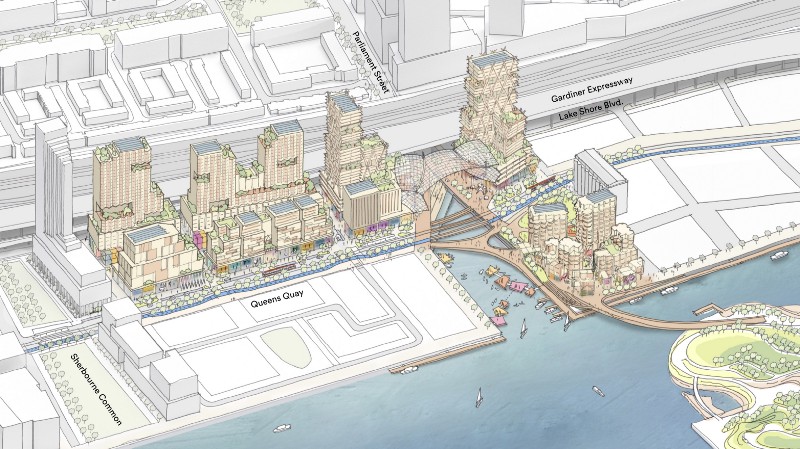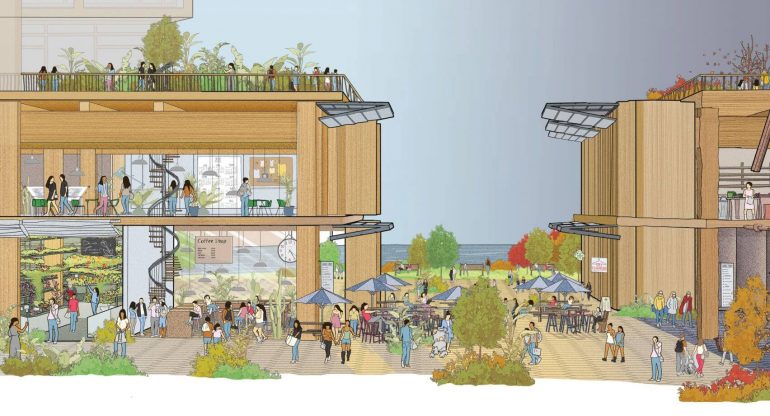The Ontario Auditor General’s report for 2018 laid out several concerns for Sidewalk Labs’ planned Quayside development with Waterfront Toronto.
One of the most concerning findings was confirmation that Waterfront Toronto, the government entity responsible for overseeing the project, had provided information to Sidewalk Labs and other potential bidders before issuing its RFP in May 2017. At the time, respondents had only six weeks to put together an RFP; while Sidewalk Labs’ proposal was accepted for being the most comprehensive, Auditor General Bonnie Lysyk’s report confirmed that Sidewalk had received more information than other bidders, and Sidewalk Labs and other shortlisted entities had signed sharing agreements.
“In order to protect the public interest, this situation does deserve government study before any long-term commitment is reached with Sidewalk Labs.”
– Bonnie Lysyk
The report found that the scope of some of Sidewalk Labs’ promises to create an area for self-driving cars and data collection fell under the jurisdiction of other federal and municipal ministries and that Sidewalk Labs did not adequately consult with these other entities before signing its initial agreement in October 2017. There were also concerns about whether Waterfront Toronto and Sidewalk Labs would actually comply with provincial procurement obligations and a Memorandum of Understanding with the City of Toronto. The latter give the City of Toronto a significant role in approving RFPs to developers for land still owned by the CIty.
In its current agreement, Sidewalk Labs and Waterfront Toronto must jointly issue RFPs to developers working within the area. However, Waterfront Toronto’s current procurement policies are required to comply with the Province’s Broader Public Sector Procurement Directive. “It is unclear at this stage how the Broader Public Sector Procurement Directive will be applied by Waterfront Toronto when issuing joint RFPs with Sidewalk Labs in order to comply with its provincial procurement obligations and the MOU with the City. Waterfront Toronto management indicated that it will comply,” the report reads.
The Ontario General’s report also indicated that the smart city site could be bigger than Quayside lands, which are only supposed to span 12 acres.

“The Plan Development Agreement stated that while the scope of planning could include the entire waterfront area, the implementation of urban innovation (smart technology that improves sustainability and efficiency in the community) is restricted to the 12-acre Quayside lands,” the report reads, referring to a Plan Development Agreement from August 2018. “However, the Plan Development Agreement permits implementation on any land owned by Waterfront Toronto or Sidewalk Labs outside of Quayside—in the wider waterfront area—but this would require approvals from all levels of government.”
The report also noted public concerns on data collection. Sidewalk Labs has been quiet about how it will handle data collection in the area—though its head has claimed that data collection won’t be used for commercial purposes. Groups like Tech Reset Canada have pushed for the federal government to look at issues like digital rights, and are among the outspoke critics of the project.
“Also absent is clarification on whether personal information, which Sidewalk Labs gathers, will be linked to its sister company’s, Google’s, existing collection of personal data in its users’ accounts,” the report reads.
After today’s Auditor General report on Waterfront Toronto, which included a review of its project with Sidewalk Labs and revealed that Waterfront gave Sidewalk information in advance of the public request for proposals, Jim Balsillie says rip it up and start again. pic.twitter.com/ISGIDobDVq
— Sean Craig (@sdbcraig) December 5, 2018
The report concluded that, overall, Waterfront Toronto has not been effective in revitalizing the Waterfront. It also said that the province lacks a policy framework to guide a project like Quayside. Any potential framework must address issues like data collection, ownership, intellectual property, and infrastructure development.
“In order to protect the public interest, this situation does deserve government study before any long-term commitment is reached with Sidewalk Labs,” Lysyk said.
See the full report here.
UPDATE (12/05/18) 16:27 PM EST:
BetaKit spoke with several members of Waterfront Toronto’s executive committee about their reaction to the report. The committee told BetaKit it was committed to complying with procurement processes and taking into account concerns outlined in the report.
On the report’s finding that the site would expand beyond 12 acres
“Quayside is not an island. In planning, we really need to look at how to stitch Quayside into the fabric of the city, to connected transit, to connected services. The Planned Development Agreement, which guides the process in the Master Innovation and Development Plan, allows Sidewalk to think a little bit more broadly….the plan will focus on Quayside, there may be elements that they propose at scale, but there is no commitment to anything beyond Quayside.”
– Meg Davis, chief development officer of Waterfront Toronto
On engaging Sidewalk before the RFP was released
“In the report, you’ll find we actually engaged over 50 organizations prior to the RFP being released, and in fact over half of those were folks we met with even before we even met with Sidewalk. So, they did not actually have additional time. We did speak with a lot of groups, and in fact, that is common best practice for writing a proposal like this, to go out into a marketplace…so we can gauge interest in the market.”
– Meg Davis, chief development officer of Waterfront Toronto
On Waterfront Toronto’s plans moving forward
“As we already do, we will continue to work closely with government partners. We have a variety of venues to do that, we have a Waterfront secretariat and we have inter-governmental steering committee that we meet with frequently for all of our projects. We’ll continue to do that and we will implement anything in addition to that the government chooses to engage with us on, and we look forward to more engagement with them.”
– Kristina Verner, VP of innovation, sustainability, and prosperity for Waterfront Toronto.
On the collection and use of data in Quayside
“We are tackling this through a number of different venues. One of which is our digital strategy advisory panel, and working with them on our evaluation criteria and the protocols that need to be followed to move forward with implementation. We’ll also be connecting our Civic Labs to provide a venue for broader subject matter experts to engage.”
– Kristina Verner, VP of innovation, sustainability, and prosperity for Waterfront Toronto. Verner noted that it would share more on this during Quayside’s public roundtable on Saturday.
In the past, the digital strategy committee has experienced high-profile resignations amidst criticisms of the project, including TechGirls Canada and Tech Reset founder Saadia Muzaffar and former OMERS CEO John Ruffolo. Former Ontario privacy commissioner and privacy expert Ann Cavoukian also resigned in October.
Sidewalk Labs spokesperson Keerthana Rang also sent the following statement:
“We reviewed the Auditor General’s report and are committed to working with all three levels of government to be responsive to any issues of concern. We have consulted with over 14,000 Torontonians over the last year, and a plan is coming into focus that would create more than 9,000 jobs from construction alone—and many more than that from the economic activity the project will generate—along with large amounts of affordable housing and innovation that will meaningfully improve quality of life for Torontonians. Together, we can do something great for Ontario.”


